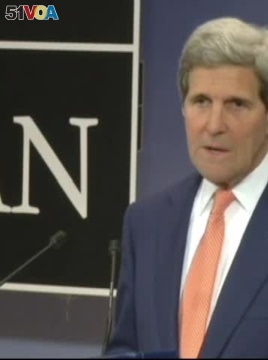June 26,2014
U.S. Secretary of State John Kerry is meeting with representatives of Middle Eastern and Gulf states to discuss security challenges in the wake of a quick advance of an Islamist insurgency. A radical group that calls itself the Islamic State in Iraq and the Levant has taken control of large swaths of northern Iraq and threatens to capture Iraq's capital, Baghdad.

The onslaught by the militants began two weeks ago, sparking panic among Shia Muslims along their path and an exodus of people from the cities that have fallen under their control.
Secretary Kerry told an audience at NATO headquarters in Brussels Wednesday that the threat is not confined to the region. "None of us need to be reminded that a faraway threat can have tragic consequences at home, in the most unexpected way and the most unexpected moment," he stated.
Kerry urged the entire international community to focus on combating the growth of extremism which increasingly crosses state borders as evidenced in Iraq.
"That's a new animal in a sense, and I think we are seeing with ISIL, crossing from Syria and moving rapidly into Iraq a similar kind of hybrid - new form of effort which is going to require people to think through strategically, intelligence gathering, preparations, response, response times, nature of response, and that's what the NATO alliance has always done effectively and that's what a lot of today's discussion focused on," he said.
Kerry said NATO members have to work on improving vigilance instead of building permanent bases.
ISIL, comprises Sunni Muslims, a group that was in power in Iraq during Saddam Hussein's rule. Since Saddam's fall, Iraqi Sunnis have complained of repression under the new government dominated by Shia Muslims. The radical group appears to enjoy support from some disgruntled Sunnis, but Iraq's Kurds also feel betrayed by the leaders in Baghdad.
The United States and its allies in the region say a more unified Iraq would be better able to fight the insurgency, but many see that as unlikely. After a meeting Wednesday with U.S. President Barack Obama, Israeli President Shimon Peres expressed pessimism about Iraq and the entire Middle Eastern region.
"I told the President [Obama] that the best thing that could have happened is that Iraq remain a united country, but I wonder if it is possible. To do so, you need really to send a mighty army to force all the three parties to come together," said Peres. "I don't see the army that will do it and I don't see the parties that will agree to it."
The Israeli president said the Middle East as a whole is taken up by terror, which causes countries to fall apart. He said the world cannot remain neutral in the face of bloodshed that is taking place there.
The Iraqi security forces are organizing to block the advance of the insurgents, but the military has not launched any major counteroffensive.
Secretary Kerry travels to Saudi Arabia Friday to discuss the situation with King Abdullah.